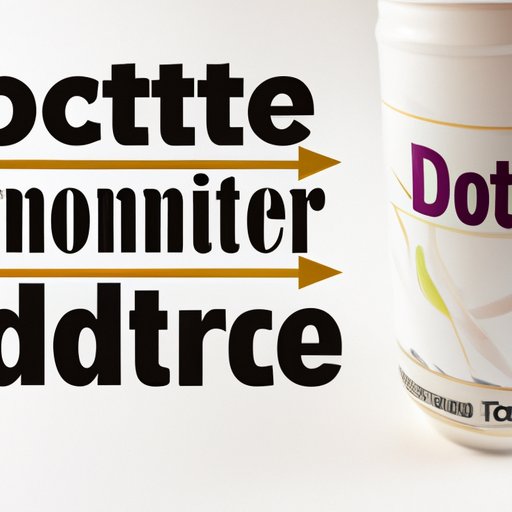
I. Introduction
One common question among pregnant women is whether or not they can safely consume Diet Coke. This article aims to shed light on the topic and provide comprehensive information on the effects of Diet Coke on pregnancy, the risks associated with excessive consumption, and recommended alternatives for a healthier pregnancy diet.
II. The Truth About Drinking Diet Coke While Pregnant: What You Need to Know
Diet Coke is a popular carbonated beverage that is marketed as a low-calorie option to regular soda. The drink contains artificial sweeteners, primarily aspartame, which give it its sweet taste. While the drink is not calorically dense, it still contains caffeine and has been linked to various health effects.
Diet Coke can have several effects on the body, including bone density reduction, tooth decay, and an increased risk of type 2 diabetes and obesity. The effects of Diet Coke are similar to those of regular Coca-Cola; however, Diet Coke does not have as many calories thanks to the artificial sweeteners.
III. Can You Safely Drink Diet Coke During Pregnancy? Here’s What Experts Say
Research studies investigating the effects of artificial sweeteners on pregnancy are limited and have produced mixed results. However, some Obstetricians and Gynecologists (OB-GYNs) have voiced their concerns about the potential harmful effects of consuming Diet Coke during pregnancy.
According to the American College of Obstetricians and Gynecologists (ACOG), moderate consumption of artificial sweeteners is not harmful during pregnancy. Still, research on pregnant animals suggests a potential link between high dosages of artificial sweeteners and adverse effects on the offspring’s weight, metabolism, and insulin levels.
IV. Understanding the Risks of Drinking Diet Coke While Pregnant
The potential health risks associated with drinking Diet Coke during pregnancy include an increased risk of preterm labor, hypertension, and gestational diabetes. Additionally, the effects of caffeine on the pregnancy can’t be ignored. Consuming large amounts of caffeine has been linked to low birth weight, miscarriage, and stillbirth. Pregnant women who consume Diet Coke should consider their caffeine intake from all sources, not just the drink.
V. Diet Coke and Pregnancy: How Much Is Too Much?
The recommended dosage of caffeine consumption during pregnancy is 200 mg or less per day. According to the FDA, the maximum amount of caffeine in a 12-ounce can of Diet Coke is around 47 mg. This means that a pregnant woman can safely consume up to four cans of Diet Coke per day if she isn’t consuming any other caffeinated sources.
However, it’s essential to note that other factors may affect the body’s tolerance to caffeine, such as age, weight, and metabolism. Therefore, it’s crucial to consult with a medical professional before consuming or exceeding the recommended dosage.
VI. Alternatives to Diet Coke During Pregnancy: Delicious and Safe Beverages
During pregnancy, it’s essential to maintain a balanced and varied diet to nourish both the mother and the growing baby. Consuming a variety of fruits, vegetables, and healthy beverages can provide essential vitamins and minerals that support a healthy pregnancy.
Some of the recommended alternatives to Diet Coke include natural fruit juices, herbal teas, and water infused with fruits and herbs. These options are not only healthier but also free from artificial sweeteners and caffeine. Additionally, drinking adequate water can help keep the body’s fluid levels balanced and reduce the risk of dehydration, a common concern during pregnancy.
VII. Pregnancy and Diet Coke: Debunking the Myths and Misconceptions
There are various myths and misconceptions surrounding the consumption of Diet Coke and pregnancy. One of the most common myths is that consuming Diet Coke can cause birth defects or developmental issues in the growing baby. However, there is currently no evidence to support this claim.
Another common myth is that consuming Diet Coke can increase the risk of cancer. Again, no current evidence supports this claim. However, it’s essential to note that many of these claims are not backed by scientific evidence and are often based on fear and rumors.
VIII. How to Cut Back on Diet Coke During Pregnancy: Tips and Strategies for a Healthier Pregnancy
Reducing excessive consumption of Diet Coke and other caffeinated and artificially sweetened products can provide numerous benefits for a healthy pregnancy. Some strategies that can help cut back on Diet Coke while pregnant include gradually weaning off the drink, replacing it with healthier alternatives, and seeking help from a medical professional or a nutrition expert.
Additionally, reducing overall sugar and calorie intake can support a healthier pregnancy and reduce the risk of gestational diabetes and other pregnancy-related complications. Women who struggle with cutting back on Diet Coke should consider speaking with their doctor or seeking professional counseling to develop healthier habits.
IX. Conclusion
In conclusion, consuming Diet Coke during pregnancy can be safe in moderation, but excessive consumption may pose serious health risks for both the mother and her developing baby. It’s crucial to stay informed and make sound decisions concerning the consumption of products containing artificial sweeteners and caffeine. By following a healthy and balanced diet plan with recommended alternatives to Diet Coke, a pregnant woman can provide the necessary nutrients and vitamins for her and her unborn baby’s health.
Call to action: Pregnant women should consult with a medical professional before consuming Diet Coke or any other caffeinated and artificially sweetened products. Maintaining a healthy and balanced pregnancy diet can benefit both the mother and developing baby’s health.





